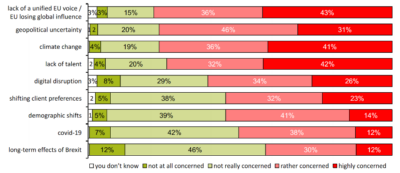- Surge in optimism regarding the overall business climate
- Asset bubbles and inflation are the leading macroeconomic causes of concern
- Financial leaders are concerned regarding the loss of competitiveness of EU financial actors on the global stage and growing fragmentation in the single market
- Lack of talent remains a key cause of operational concern for leaders, however an overwhelming majority are confident about their ability to handle the cybersecurity challenge
- Financial leaders are confident about their organisations ability to handle the challenges stemming from sustainable finance
Business confidence is significantly up compared to the previous 12 months; this according to more than 60% of the over 400 c-suite executives and senior leaders from Luxembourg’s financial centre surveyed by Luxembourg for Finance in October 2021. In line with the increased confidence, more than half of individuals surveyed expect their organisation to increase global investments in 2022, 33% more than a year ago.
Despite this growth in confidence, financial leaders are wary of emerging macro-economic risks, most notably asset bubbles and inflation, including the significant accumulation of public debt, the rapid rise of energy prices, and skyrocketing real estate prices.
Concern over single market fragmentation and lack of access to talent
Increasingly protectionist reactions at a national level are seen as a key concern, with almost 80% of respondents indicating concern over the growing fragmentation within the single market. Participants stressed the need to overcome national action by member state authorities and rather to focus on an overall EU objective in order to overcome the loss of competitiveness currently seen among EU financial actors on a global stage (see Figure 1).
The industry has recovered well from the initial turmoil seen during the Covid-19 pandemic, with 49% of respondents indicating that they were no longer concerned about the pandemic’s influence on financial services. Additionally, a majority of respondents (58%) were not concerned about the long-term effects of Brexit, showing that the industry has adapted well to the new situation.
Figure 1: Socio-economic factors of concern (How concerned are you, if at all, about the following factors of disruption to the overall financial services climate?)

Source: Luxembourg for Finance Financial Services Survey, October 2021
Note: Numbers may not add due to rounding.
Access to talent remains a key issue for the global financial services industry. In Luxembourg, 51% of respondents are not confident in their organisations’ ability to address the issue, up from 44% in April this year.
On the other hand, firms in Luxembourg have clearly taken to heart the need to protect vulnerable systems and client data, with 79% confident in their organisations ability to handle the cybersecurity challenge. Additionally, the shift to home-based work has been smooth, with 88% of respondents confident in their organisations ability to deal with any possible challenges that might arise in the coming 12 months.
Luxembourg’s Financial Services industry well prepared
In general, Luxembourg’s financial services industry seems to be well-prepared to handle the challenges relating to sustainable finance: 71% of respondents are confident in their organisations ability to include ESG considerations into client advice, 64% in identifying sustainable investment opportunities, and 68% in designing sustainable products. However, the availability of quality sustainable data and the fragmentation of standards remain major concerns for respondents, in line with the global trend.
Commenting of the results, Nicolas Mackel, CEO of Luxembourg for Finance, said: “Given increasing macro-economic challenges and nationalistic voices against the single market it is critical that financial services across the EU work well to finance the recovery sustainably and effectively.
Thus, the surge in optimism relating to the overall financial services climate is encouraging as finance will have a large role to play in rebuilding the global economy.”
